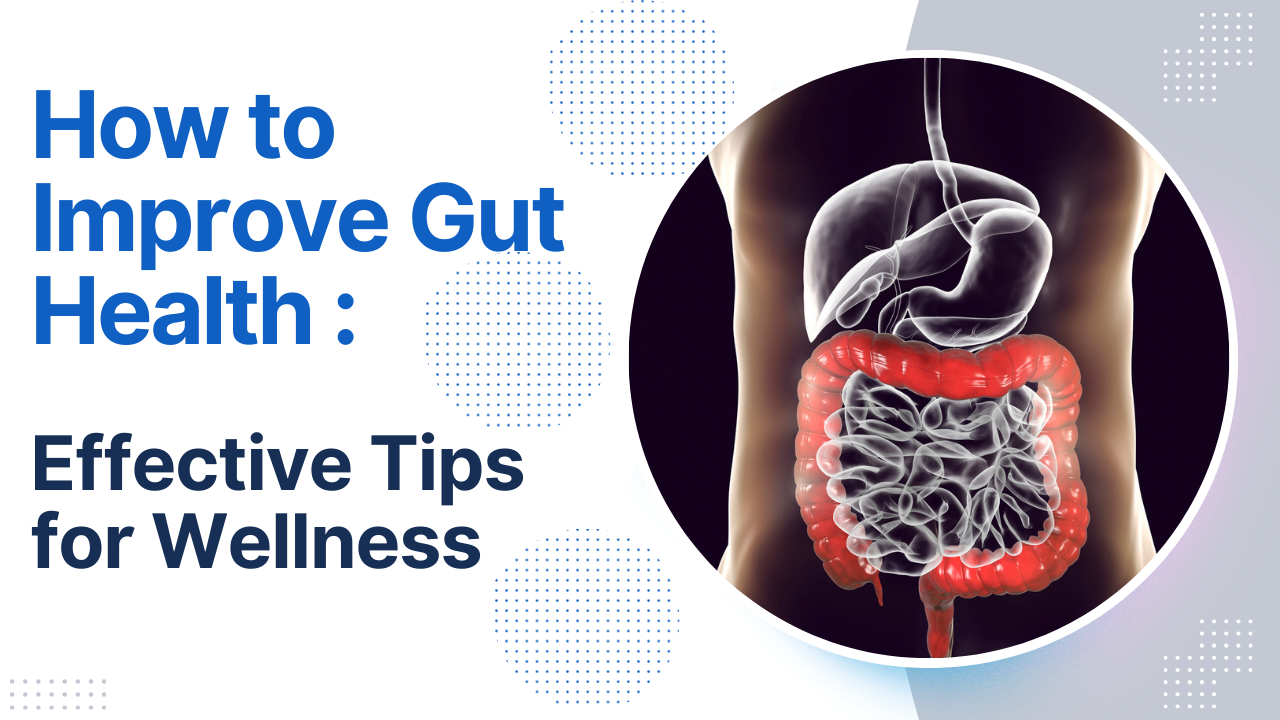Your gut health plays a much bigger role than just helping with digestion. It is part of a complex system that influences your immune system, mental clarity, mood, skin condition, energy levels, and even your weight. When your gut microbiome becomes unbalanced, it can lead to digestive discomfort, low immunity, fatigue, or other health issues.
Understanding how to improve gut health is essential for your overall well-being. A healthy gut can help your body absorb nutrients better, fight off harmful bacteria, and reduce inflammation. It also supports better brain function and mood regulation by producing important neurotransmitters like serotonin.
Fortunately, there are many simple steps you can take each day to support your gut. These include eating more fiber-rich foods, drinking plenty of water, getting enough sleep, and reducing stress. By making small but consistent changes to your lifestyle, you’ll learn how to improve gut health and enjoy lasting benefits.
In this article, we will explore eight effective tips to improve gut health, backed by the latest research and expert advice. Whether you’re looking to address digestive problems, boost your immune system, or enhance overall well-being, these tips will guide you on your journey toward a healthier gut.
What is Gut Health ?

Gut health means how well your digestive system works and stays balanced. It includes your stomach, intestines, and other parts of the gastrointestinal (GI) system. Inside your gut live billions of tiny organisms such as bacteria, fungi, and viruses. These microbes make up what’s called the gut microbiome, and they are very important for your health.
The gut microbiome helps your body break down food and absorb nutrients. It also protects you by fighting off harmful bacteria and supports the immune system. Some of these microbes even help your body make vitamins and other helpful substances, like short-chain fatty acids that keep the gut lining strong and healthy.
But sometimes this balance of good and bad microbes can be disrupted. This is called dysbiosis. It can cause bloating, gas, constipation, diarrhea, or even food sensitivities. In more serious cases, it may lead to conditions like irritable bowel syndrome (IBS) or inflammatory bowel disease (IBD).
Learning how to improve gut health is key to feeling better. Simple steps like eating more fiber, cutting down on processed foods, and managing stress can help restore balance in the gut.
The Importance of Gut Health
Digestive Support: A healthy gut helps your body digest food properly and absorb nutrients. A well-balanced gut microbiome makes this process smooth, which supports your overall health. Learning how to improve gut health can help prevent issues like bloating and poor digestion.
Stronger Immunity: Most of your immune system is found in the gut. The gut microbiome helps control immune responses, making it easier for your body to fight off illnesses. Strengthening your gut is an important step in how to improve gut health.
Better Mental Health: The gut and brain are closely connected through the gut-brain axis. A healthy gut can lift your mood, ease anxiety, and improve focus. Knowing how to improve gut health may support emotional well-being.
Healthier Skin: Skin problems like acne or eczema are often linked to poor gut health. When you focus on how to improve gut health, your skin may become clearer and more vibrant.
Weight Control: Gut microbes help regulate how your body stores fat and manages weight. Understanding how to improve gut health can help support healthy metabolism and weight loss.
Top Tips For How To Improve Gut Health
Now, let’s dive into the practical tips that can help you improve and maintain a healthy gut.
Eat a Diverse Range of Foods

A healthy gut needs a wide variety of good bacteria. One of the best ways to support this is by eating many different types of food. When you add variety to your meals, you give your gut the nutrients it needs to grow a strong and balanced microbiome.
Different bacteria feed on different nutrients. So, when you eat a mix of foods—especially fruits, vegetables, whole grains, and legumes—you help more types of beneficial microbes grow in your gut. This creates a more diverse and stable environment.
Learning how to improve gut health starts with your plate. The more colorful and plant-rich your meals are, the better your gut will feel and function. A diverse diet not only supports digestion but also benefits your mood, immune system, and overall well-being.
Key Points to Remember:
To learn how to improve gut health, start by eating a wide range of plant-based foods. Fruits, vegetables, whole grains, legumes, and nuts are rich in fiber and natural compounds like polyphenols that help feed the good bacteria in your gut.
Adding fermented foods to your meals is another great way to support gut health. Foods like kefir, sauerkraut, kimchi, and miso contain live probiotics that help boost the number of healthy microbes in your digestive system.
A simple tip for how to improve gut health is to aim for a colorful plate. Different colors in fruits and vegetables often mean different nutrients, and your gut thrives on that variety. The more colorful your meals, the more you’re helping your gut stay balanced and strong.
Foods to Include:
High-fiber fruits and vegetables: Berries, bananas, apples, carrots, spinach, and broccoli.
Whole grains: Oats, quinoa, brown rice, and barley.
Legumes: Lentils, chickpeas, and beans.
Fermented foods: Kimchi, sauerkraut, kombucha, and kefir.
Prioritize Prebiotics and Probiotics
Understanding how to improve gut health starts with knowing the roles of prebiotics and probiotics. These two work together to keep your gut balanced and strong.
Prebiotics are special types of fiber found in foods like bananas, onions, garlic, and oats. They don’t get digested by your body but serve as food for the good bacteria in your gut, helping them grow and stay active.
Probiotics, on the other hand, are live bacteria found in fermented foods like yogurt, kefir, and kimchi. They help add more good microbes to your gut, improving its diversity. Including both prebiotics and probiotics in your diet is an effective way to support digestion, immunity, and overall well-being.
Prebiotic-rich foods include:
Onions
Garlic
Leeks
Bananas (especially green ones)
Chicory root
Artichokes
Probiotic-rich foods include:
Yogurt (with live cultures)
Kefir
Sauerkraut
Kimchi
Miso
Kombucha
Tempeh
While prebiotics nourish good bacteria, probiotics directly contribute to the gut’s health by introducing beneficial microbes. Together, these two play complementary roles in supporting a balanced microbiome.
Limit Your Intake of Processed Foods

One important step in learning how to improve gut health is reducing highly processed foods. These foods often contain high amounts of sugar, unhealthy fats, and artificial sweeteners that can harm your gut.
When you eat too many processed items, they can feed the wrong kinds of bacteria in your gut. This allows harmful microbes to grow, which throws off the balance of your gut flora. An unbalanced gut can lead to problems like bloating, inflammation, and poor digestion.
Over time, this imbalance—known as dysbiosis—may even weaken your immune system and affect your mood. To support a healthier gut, try to limit packaged snacks, sugary drinks, and processed meals. Instead, focus on whole foods like fruits, vegetables, and grains.
Why You Should Avoid Processed Foods:
Processed foods often contain high amounts of sugar, which can fuel the growth of harmful bacteria and yeast in the gut, potentially leading to conditions like candida overgrowth.
Many processed foods contain artificial sweeteners like aspartame and sucralose, which have been shown to alter the gut microbiome and cause digestive issues in some people.
Excessive amounts of refined carbs can promote the growth of bad bacteria and reduce the diversity of the microbiome.
Instead of reaching for processed snacks, opt for whole, nutrient-dense foods that support your gut health. If you need a quick snack, try a handful of nuts, fruit, or yogurt.
Stay Hydrated
Drinking enough water is an easy but powerful way to support your digestive system. If you’re wondering how to improve gut health, staying well-hydrated is a great place to start.
Water helps break down food in your stomach, making it easier for your body to absorb nutrients. It also supports the lining of your intestines, which is important for a strong and healthy gut barrier.
In addition, water keeps things moving in your digestive tract. It softens stool and helps prevent constipation, allowing your body to remove waste more efficiently. Drinking plenty of water every day is a simple habit that plays a big role in keeping your gut in balance.
The Importance of Hydration for Gut Health:
Drinking enough water helps maintain healthy digestion and prevents constipation by softening stools and facilitating smoother bowel movements.
Water is also necessary for the production of digestive enzymes and acids, which aid in the breakdown of food.
Hydration is essential for maintaining the integrity of the gut lining, which acts as a barrier to harmful substances.
Aim to drink at least 8 cups (64 ounces) of water daily, more if you are active or live in a hot climate.
Manage Stress

Stress affects more than just your mood—it can also harm your digestive system. If you’re exploring how to improve gut health, managing stress is a key part of the process.
When you’re under stress, your body releases cortisol, a hormone that can slow down digestion and disturb the balance of bacteria in your gut. This imbalance may lead to issues like bloating, constipation, or diarrhea.
Chronic stress can weaken your gut’s protective barrier and increase inflammation, making gut problems worse over time. To support a healthy gut, try stress-relieving activities such as deep breathing, walking, or getting enough sleep. Taking care of your mental health is a smart step in learning how to improve gut health.
How Stress Affects the Gut:
Increased gut permeability: Chronic stress can damage the gut lining, leading to “leaky gut,” a condition where harmful substances pass through the gut into the bloodstream, causing inflammation.
Disrupted gut microbiome: Stress can alter the diversity of gut bacteria, leading to an overgrowth of harmful microbes and a decline in beneficial bacteria.
Digestive symptoms: Stress exacerbates conditions like IBS, causing symptoms like cramps, bloating, and irregular bowel movements.
To improve gut health, prioritize stress management techniques like:
Meditation or mindfulness
Yoga
Deep breathing exercises
Regular physical activity (e.g., walking, swimming, or cycling)
Get Regular Exercise
Exercise helps more than just your muscles—it also supports your gut. If you’re looking into how to improve gut health, adding regular physical activity to your routine can make a big difference.
When you stay active, your body boosts blood flow and improves digestion. Studies show that exercise can change the makeup of your gut microbiome, helping grow more beneficial bacteria that support better gut balance and function.
Even light daily movement like walking, stretching, or biking can have a positive effect. Over time, this can lead to fewer digestive issues, a stronger immune system, and better overall well-being. Making exercise a regular habit is a simple and effective way to learn how to improve gut health.
Exercise and Gut Health:
Physical activity increases the diversity of gut bacteria, which is associated with a healthier microbiome.
Exercise helps reduce stress, which, as discussed, has a significant impact on gut health.
Regular movement also supports the motility of your digestive system, helping prevent constipation and promoting regular bowel movements.
Aim for at least 30 minutes of moderate exercise most days of the week. Activities like walking, cycling, swimming, and strength training are all beneficial for your gut.

Get Enough Sleep
Your gut and your sleep are closely connected. If you’re learning how to improve gut health, getting good sleep is an important step you shouldn’t overlook.
Your gut microbiome works in sync with your body’s internal clock, also known as the circadian rhythm. When you don’t sleep well or stay up too late, it can throw off this rhythm and affect how your gut functions.
Poor sleep can lower the number and variety of healthy gut bacteria. Over time, this may lead to digestive problems like bloating, irregular bowel movements, or discomfort. To support your gut, try going to bed at the same time each night and aiming for 7–9 hours of rest. Sleep is a natural tool in your journey of how to improve gut health.
The Role of Sleep in Gut Health:
Sleep disturbances can alter the balance of gut bacteria, leading to increased inflammation and digestive issues.
Lack of sleep is linked to a higher risk of gut-related diseases like IBS and acid reflux.
A good night’s sleep supports the gut-brain axis, helping regulate mood, digestion, and immune function.
Aim for 7-9 hours of quality sleep each night to support both your gut and overall health. Practice good sleep hygiene by sticking to a regular sleep schedule and creating a calming bedtime routine.
Avoid Overuse of Antibiotics
Antibiotics are important for treating infections, but using them too often can affect your digestive system. If you’re learning how to improve gut health, it’s helpful to understand their impact.
While antibiotics kill harmful bacteria, they also destroy some of the good bacteria in your gut. This disruption can reduce the variety and strength of your microbiome, making it harder for your gut to stay balanced and healthy.
After taking antibiotics, your gut may take time to recover. You might experience digestive issues like bloating, diarrhea, or discomfort. To support your gut, try eating probiotic-rich foods, staying hydrated, and avoiding unnecessary antibiotic use. These steps can help you restore balance and are important when focusing on how to improve gut health.

The Dangers of Overusing Antibiotics:
Antibiotic overuse can lead to antibiotic resistance, making it harder to treat infections.
Disrupts the microbiome, which may contribute to digestive issues like diarrhea, bloating, or yeast overgrowth.
Increases the risk of developing chronic conditions like IBD or IBS.
Only take antibiotics when prescribed by a healthcare professional and always complete the full course as directed. If possible, choose alternatives like probiotics or natural remedies for minor health issues.
Conclusion
In conclusion, how to improve gut health involves making mindful choices that promote a balanced microbiome and overall well-being. By including a diverse range of foods, focusing on prebiotics and probiotics, staying hydrated, and managing stress, you can significantly enhance your digestive health. Regular exercise, adequate sleep, and avoiding the overuse of antibiotics also play key roles in maintaining a healthy gut.
Remember, a balanced gut supports not only digestion but also immune function, mental health, and skin health. While the journey to better gut health is gradual, consistent effort toward these habits can lead to long-lasting improvements. By taking small, sustainable steps, you can optimize your gut health and enjoy the numerous benefits it offers for your body and mind. Keep these tips in mind, and you’ll be on your way to a healthier, happier gut in no time!

FAQs
Q.1 What foods are best for improving gut health ?
Foods high in fiber, like fruits, vegetables, whole grains, and legumes, are excellent for supporting gut health. Additionally, fermented foods like yogurt, kefir, kimchi, and sauerkraut provide probiotics, which help maintain a healthy balance of gut bacteria.
Q.2 How can stress impact my gut health ?
Chronic stress can disrupt the balance of bacteria in your gut, leading to digestive issues like bloating, constipation, and even conditions like IBS. Stress can also affect gut permeability, potentially leading to a “leaky gut” and inflammation.
Q.3 Can exercise improve gut health ?
Yes, regular exercise helps increase the diversity of gut bacteria, supports digestion, reduces stress, and promotes regular bowel movements. Aim for at least 30 minutes of moderate exercise most days of the week.
Q.4 How do antibiotics affect gut health ?
Antibiotics, while necessary for treating bacterial infections, can also kill beneficial gut bacteria, leading to imbalances and digestive issues. It’s important to use antibiotics only when prescribed and avoid overuse.
Q.5 How long does it take to improve gut health ?
The timeline can vary depending on your lifestyle and dietary changes. Some people may notice improvements in digestion and energy within a few weeks, while achieving a fully balanced microbiome could take several months. Consistency is key!



